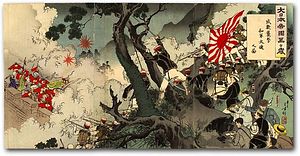This week, Chinese academics and media outlets showcased a huge number of essays analyzing the First Sino-Japanese War. These articles rehashed a 120-year-old war, with many seeming eager to fight Japan again to wipe clean the shame of China’s earlier defeat. Such essays promised that China would absolutely not be defeated again.
In my opinion, some of the reflections about the 120-year-old First Sino-Japanese War happening 120 years ago by scholars and the media are overdone. In truth, China lost the First Sino-Japanese War because of the corrupt and incompetent Qing Dynasty, which brutally exploited the Chinese, especially the Han people. What’s more, for a long time, the true purpose of the Qing Dynasty’s armed forces (whether army or navy) was not to resist foreign invasion, but rather to prevent rebellions and suppress Han uprisings. The powerful Qing army enabled the dynasty to continuing abusing its people, and kept afloat an ugly system that should have ended long before it did.
The Qing Dynasty had fallen behind the world by a few hundred years, was thoroughly corrupt, and was against the tides of history. Historically, very few dynasties like this have succeeded in using their armies and navies to defeat invasions. We can even see the defeat of these dynasties as a sort of historical progress. The Qing Dynasty was defeated, but in the end the Japanese invaders also fell. The German fascists and Hitler also met a miserable end, and even the Soviet Union, a nuclear-armed superpower, could not claim victory.
Looking back at the First Sino-Japanese War, we cannot ignore historical continuity: it was precisely because the Qing Dynasty was defeated in this war that it lost all of its remaining legitimacy and popular support. From this came the Xinhai Revolution in 1911 and the founding of Asia’s first republic. Those events, in turn, led to present-day Taiwan’s democratic model and the rise of an economic power on the mainland under the leadership of the Chinese Communist Party. It’s no problem to look back at the First Sino-Japanese War, but it is both ridiculous and shameful to feel overly attached to the Qing Dynasty, let alone trying to find ways to reverse its failure. It was a horrible crime for Japan to invade China, but that cannot cover up the fact that the Qing Dynasty was a decadent and declining dynasty that existed in opposition both to historical trends and to the Chinese people!
So, when we think about the reason the Qing Dynasty lost so many wars, we should take the perspective of the Chinese people and the Chinese nation, or use a broader historical perspective — but we shouldn’t look at the problem from the Qing Dynasty’s perspective. More importantly, we should never put today’s China on the same level as the Qing Dynasty of 120 year ago. Or should we all put on Qing dynasty outfits, cut our hair into Manchu queues, and kowtow, yelling “Long live the Qing Dynasty” or (even worse) “Avenge the Qing Dynasty”?
Chinese people are ashamed that the Qing Dynasty was defeated by Japan, but it is also shameful that such a corrupt regime ruled China for so long. We should take care to reflect on and wipe clean all our historical shame, not just focus on one.
I believe that the best way of learning from the Sino-Japanese War is the path that President Xi Jinping has chosen: eliminating corrupt “tigers” in the military like Xu Caihou and tackling corrupt practices that have long since become second nature within the armed forces — for example, the buying and selling of positions and cheating in or faking military exercises.
Who can defeat an army that fights for the people rather than against the people? Even the United States and the Eight Nation Alliance of the Boxer Rebellion combined could not shake an army that has earned the support of 1.3 billion people! When looking back at the Sino-Japanese War, we should take this macro viewpoint. Only then can our military, country, and people be truly invincible.
A modified version of this piece also appeared in Chinese on Yang Hengjun’s blog. The original post can be found here.
Yang Hengjun is a Chinese independent scholar, novelist, and blogger. He once worked in the Chinese Foreign Ministry and as a senior fellow at the Atlantic Council in Washington, DC. Yang received his Ph.D. from the University of Technology, Sydney in Australia. His Chinese language blog is featured on major Chinese current affairs and international relations portals and his pieces receive millions of hits. Yang’s blog can be accessed at www.yanghengjun.com.

































